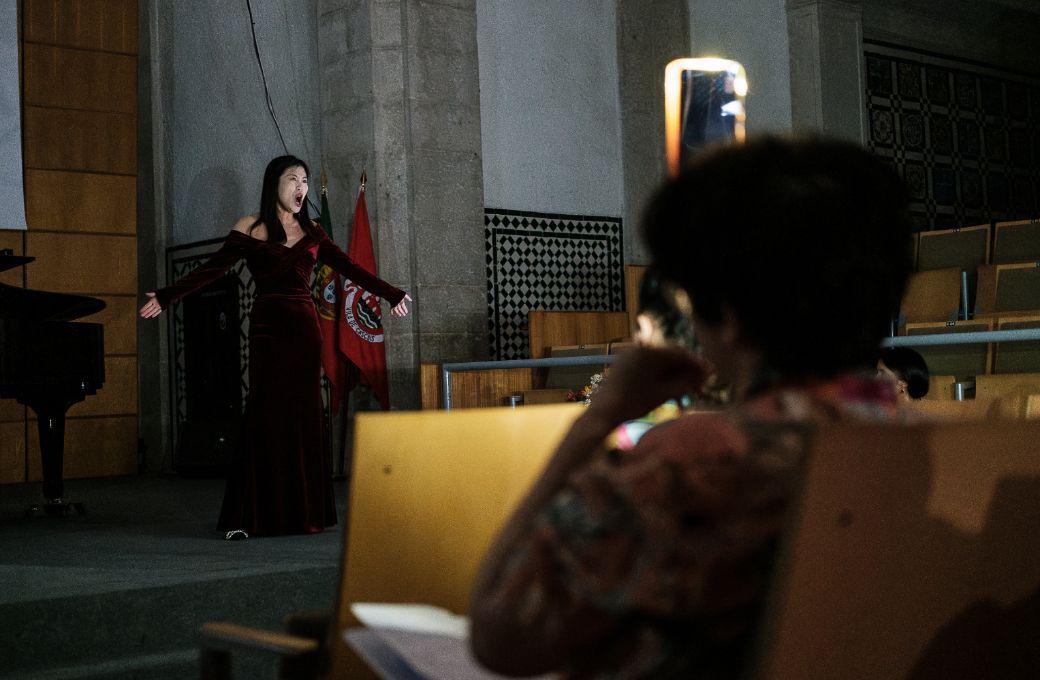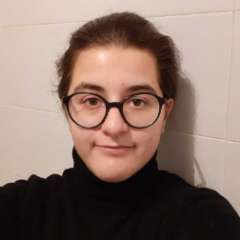On 28th April, the second day of semifinals of the Cascais Opera International Vocal Competition had just begun when a massive power outage hit the entire Iberian Peninsula, plunging it into chaos for the day. But as lights went over the Portuguese Riviera, and in the concert hall of the Centro Cultural de Cascais, neither the contestant – Chinese soprano Manhan Qi – nor the staff seemed discouraged: the performance proceeded unruffled thanks to a dozen flashlights and Qi’s steady nerves. In the face of unexpected adversity, the accident made clear how much care and determination lie behind the organisation of the Cascais Opera, which has quickly become a vital part of the city’s cultural scene. This year, I had the chance to report on the last week of the competition, from 27th April to 4th May – all the while taking time to experience Cascais’ marvellous Atlantic coastline.

Born only in 2024, the Cascais Opera Competition has caught favourable Atlantic winds, judging from the numbers. Applications have almost doubled since the inaugural edition, indicating that the contest has been gaining considerable traction. This year, different venues for each round were spread between Cascais and Lisbon, including the beautiful Museu Condes de Castro Guimarães, the Cidadela Palace, and the auditorium of the Calouste Gulbenkian Foundation. The resident jury is composed of professionals whose contributions to the opera world are many and varied, including prominent singers and artistic directors of major theatres. As in an azulejo, every different tile plays a part in a memorable design.
The Competition’s success is aided by a close-knit team with consistent support of local and national authorities. Conversations about a Cascais-based international vocal competition started between founders Alexandra Maurício, Sergei Leiferkus, and Adriano Jordão, quickly developing into a concrete project. Leiferkus, who has brought his decade-long experience as a baritone to the competition, recalled with enthusiasm:
“We immediately received the green light to start working on the first edition of the contest. It is thrilling to organise major events like this in Portugal, and particularly in Cascais. The place bursts with culture and history. We wanted to take part in this big picture and create a space for emerging artists from Portugal and abroad.”
Indeed, young talents are the fuel that makes the Cascais Opera’s engine run smooth. Contestants are welcomed into an environment that diverges from the ultra-competitivity of similar events, instead offering them chances to grow as artists. This isn’t to say that the awards aren’t generous: for this edition alone, the top prize – the Grand Prix, which includes a contract with the São Carlos National Theatre – was followed by two first prizes, for female and male voice respectively, one second prize, one third prize, and a plethora of contracts with theatres all over the world. Admittedly, it’s hard not to overlook such opportunities. However, a quick look at the programme – and my own first-hand experience – reveal that awards are only a part of the contest’s larger scope.
This year, five full days from the live competition were dedicated to masterclasses with guests including sopranos Anna Samuil and Juliane Banse, mezzo Jennifer Larmore, opera director Aleksandar Nikolić, stage director Jorge Balça and Leiferkus himself. The sessions covered both singing and acting skills, with most mentors also part of the jury. Having more time to get to know one another and form a closer bond enriched the experience of the contest on both sides. And that wasn’t all: throughout the semifinals and finals, singers were tutored and given feedback by the jurors after each performance. While this kept the jury’s musical priorities transparent, it also provided the participants with precious insights. In this sense, as Samuil clarified, “the Cascais Opera is not just a competition; it’s more like a full-scale festival or even an academy for young singers. It is truly unique.”
Having followed the contest in its final – and busiest – phase, Samuil’s impressions match my own. For the two days of semifinals that marked my introduction to the contest, the 20 candidates were required to present a selection of three arias, each of them in a different language. The result was an interesting balance between staples of the operatic repertoire – Die Zauberflöte being a most popular choice – and other delightful works like the two zarzuelas La tabernera del puerto and El barbero de Sevilla. Despite the high stakes of these semifinals, the singers and their collaborative pianists put together a two-day recital that felt more like a welcome opportunity to share music together than a competition.
Following the announcement of the finalists – unperturbed by the blackout thanks to the bright Portuguese sun – the contestants split into two groups. While the eight finalists were given a few days to rest before the beginning of rehearsals, the remaining twelve were invited to apply to masterclasses, as a chance to go over their performances and receive some valuable, seasoned advice. Most of the semifinalists signed up, which allowed me to tag along for part of the day and see how things proceeded.
The first set of masterclasses was led by Leiferkus, who walked baritones Sunu Sun and Milan Perišić through some of the arias from the semifinals. Instructions about technical and interpretative details went side by side with anecdotes from the past, culminating in Sun’s work on “Ya vas lyublyu” from Tchaikovsky’s The Queen of Spades. In the afternoon, Samuil aided sopranos Soraya Méncid and Rosalind Dobson refine their renditions of Bellini, Donizetti, and Mozart. Precise tips about stylistic peculiarities, phrasing, and technique were interspersed with the occasional suggestion to master a tough passage through an exercise of imagination – resulting, for instance, in coloraturas improved by pretending to be chewing candy.
All the hard work was eventually channelled into the semifinalists’ concert on 30th April, where each singer performed their repertoire before a numerous audience accompanied by pianist Michael Sikich. The programme converged towards three audience favourites – Gounod, Bellini, and Mozart – and ended on a pyrotechnic note with Oksana Pynchuk’s “Glitter and be gay”. Even if not as grand as the final, a curious, enthusiastic audience can be just as good a springboard for young talents as any. As jury member Eline De Kat noted, “competitions like the Cascais Opera can help young singers gain experience to sing in public and to have direct contact with people from the profession. That’s essential to grow both confidence and exposure.”
My last duties as a reporter required moving to Lisbon for the weekend. The Calouste Gulbenkian Foundation lent its rehearsal rooms and auditorium to the Cascais Opera, where the eight finalists practiced with the Orquestra Sinfónica Portuguesa led by its current Chief Conductor Antonio Pirolli. Expectably, the shift from piano accompaniment to orchestra called for some adjustments on the singers’ side, just as the ensemble needed time to digest the pieces. However, it is these frictions that make following rehearsals so enjoyable, witnessing the process of a concert gradually coming together.
The day of the momentous final arrived on 4th May. With Portugal’s public television network RTP involved, the Cascais Opera team put on quite a show. The programme featured two arias per each singer, framed by the overture from La forza del destino and intermezzo from Manon Lescaut. The tension was palpable, and the scale of the event made the contestants err on the side of caution, but everything held together well. Pirolli drew on the reputable tradition of Italian operatic conducting, emphasising lyricism above all. This was fitting in pieces by Puccini and Mascagni, while a little less convincing for Wagner’s Tannhäuser and Verdi’s Falstaff. As a surprise treat before the announcement of the winners, the singers closed the concert with the “Champagne song” from Die Fledermaus – and then the awards started coming in.
While two sopranos, Defne Celik and Manhan Qi, winning the third and second prize, and baritone Viktor Aksentijević earning the first prize for male voice with his heartfelt “O Carlo, ascolta”, it was mezzos that swept this edition of the Cascais Opera. Anna Tetruashvili secured the first prize for female voice with her versatile repertoire – including Gounod’s Roméo et Juliette and Rossini’s La Cenerentola – and Portugal’s own Ana Rita Coelho won the Grand Prix and the Audience Prize. For the final, Coelho sang “Werther! Qui m’aurait dit… Ces lettres!” from Massenet’s Werther and “Voi lo sapete, o mamma” from Mascagni’s Cavalleria rusticana. Coelho, who used to sing in a choir, stands out for the intensity of her interpretations and a solid, well-projected voice that’s even across registers. By her own admission, her goal is to “reach the audience… and stir emotions with my singing.”
If it wasn’t clear by now, it’s well worth keeping an eye on these young artists, especially as they get involved in full theatrical productions. As for the Cascais Opera Competition – I’m sure its future will be just as bright.
See more about the Cascais Opera – International Vocal Competition.
This article was sponsored by Cascais Opera – International Vocal Competition.


